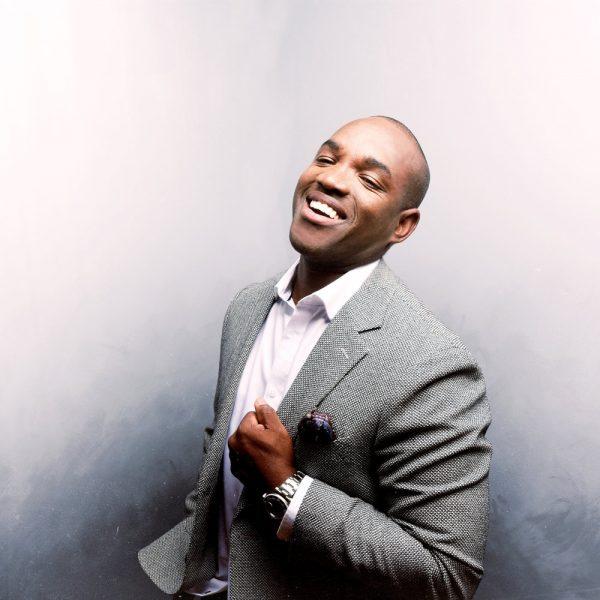
Lawrence Brownlee is one of the greatest bel canto singers of our time. He was named “Male Singer of the Year” in 2017 by International Opera Awards and Bachtrack. He’s been invited onto the most prestigious stages in the world. “The word ‘honey’ comes to mind,” mezzo-soprano Joyce DiDonato once said of this voice.
But he didn’t always want to be a great singer.“The interesting thing about me, when I was a child I sang at church; I sang with my family,” Brownlee said. He sang gospel with both his parents, his four sisters, and his brother. “But in the beginning, I didn’t want to be a singer. I wanted to be a lawyer!”
Brownlee had this vision of himself in suits, going into the courtroom every day, and eventually becoming maybe a judge. But all along the way, people at church and people at school would notice his voice.
“[They] would tell me I had a special gift. They would tell me, ‘You have to pursue this gift, because you have something the world needs to hear,’” Brownlee remembered. Gradually, he gained confidence in this idea, and he thought, yes, he could be a singer.
Around age 18 or 19, Brownlee listened to albums of “The Three Tenors”—Plácido Domingo, José Carreras, and Luciano Pavarotti—and became enamored with the heart-rending pieces about love and death. Brownlee wanted to sing about pain and death in stories filled with passion and poison.
And then a voice teacher gave him Rossini’s “The Barber of Seville,” a comedy.
Begrudgingly, he sang it.
“This is your voice; this is what you were born to sing,” Brownlee’s teacher told him. He wasn’t immediately happy about it, but this became his first foray into bel canto, into learning about what it was, and the music.
Gradually, he realized this was his calling.

A Gift
“I truly believe that my voice is a gift from God,” Brownlee said. During each performance, although he isn’t singing about God, Brownlee takes it as a chance to give his thanks for the gift, and vows to make the best use of the gift as he can.He believes this is what inspires him to improve boundlessly.
“Believing in this, [I] have this idea that you want to perfect a gift that’s been given. And that is a responsibility for me as an artist: to continue to be better,” he said. “For me, the gift is not mine; it is the gift of the giver. So I have to be worthy of the gift, if that makes sense.”
Fate has given him what he calls a good “natural voice,” but to turn it into something that can bring others joy is a work of craft, Brownlee explained.
“People come into the theater to enjoy. They want to be entertained; they want to have an experience that is different from the everyday,” he said. “They want to appreciate the music of the great composers, so I want to do what the intention of the composer was. ... Bringing joy and bringing happiness with this art form that I am a part of is what I want to use my voice for.”
A comment that’s stuck with Brownlee is the remark that when he sings it sounds like the sun is shining through.
“I think that is something that’s within, that is coming out through the voice,” Brownlee said. “Otherwise, I think we’re just normal, and we’re just repeating something rather than creating something in the moment. I want to be an artist and create art.”
And as an artist, Brownlee always has the audience in mind, so there is a balance in knowing himself and his own standards, and knowing what he can give to the audience.
“We as singers are not always in a perfect voice,” Brownlee explained. There are days when you’re fatigued or struggling with allergies or the weather or any other physical ailment that means your natural voice is not in perfect shape. At that time, you have to find another reason to be confident that you can give a great performance on stage.
“I am often elevated by something from within,” he said. “Sometimes you have to lean on technique ... Sometimes I have to give something else.”
It’s in the words of the text; it’s in the meaning of the story, the acting, the language, the timing, and how one carries oneself. You consider it all, even when your voice is in good shape, but a certain negotiation has to happen when it’s not, Brownlee said.
“This is all a part of what we do as performers. It’s not just singing. It’s not just, ‘Oh, I have a nice voice.’ My voice is only one part of who I am as an artist,” he said. “I want to communicate. I want to be a good actor. I want to be good on stage and comfortable, have a great command of the language, and have a great command of the story and be believable.”
“And more than anything, have fun and touch people, make someone happy,” he said.
Opera and classical music have existed for centuries because they touch people in a universal and timeless way, and Brownlee says he is just adding his voice to a long line of tradition. And as a steward of this beautiful gift, he is adding his voice to opera.